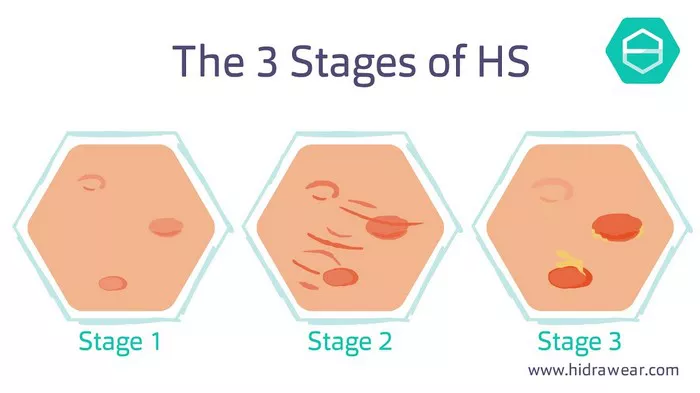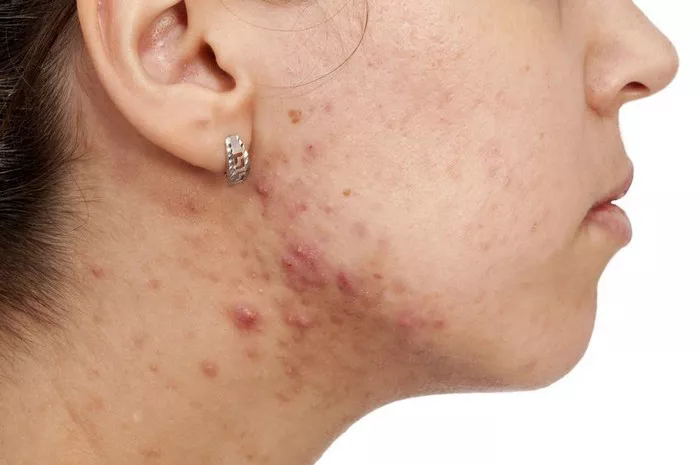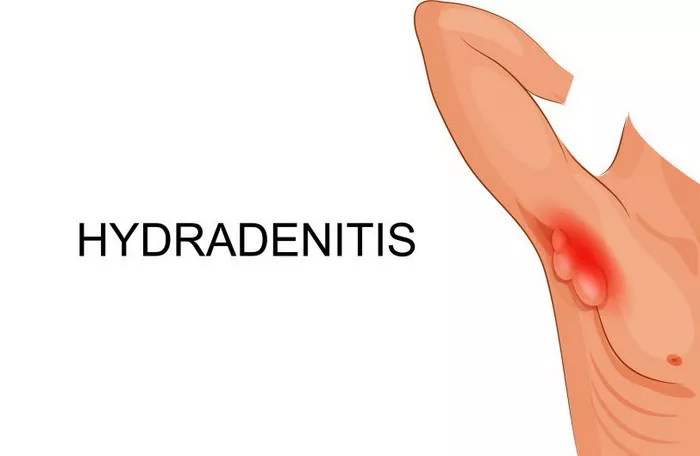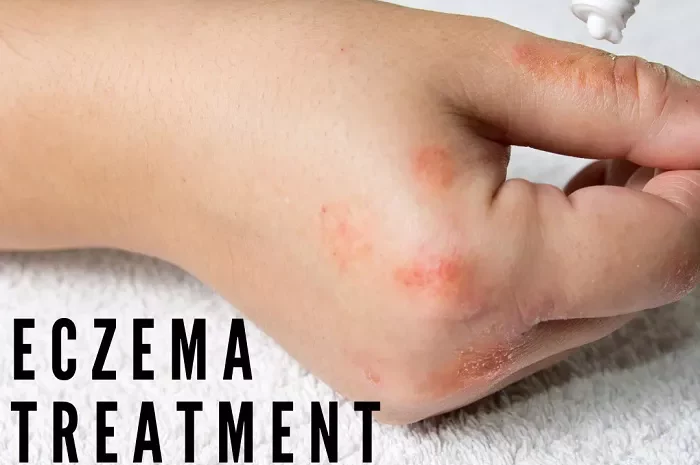Hidradenitis Suppurativa (HS) is a chronic skin condition that affects areas of the body with hair follicles and sweat glands, such as the armpits, groin, buttocks, and under the breasts. This condition can cause painful bumps, abscesses, and tunnels under the skin. One of the most common and distressing symptoms of HS is the strong, unpleasant odor that comes with the condition. If you or someone you know is dealing with HS, you may have wondered why it smells so bad. In this article, we’ll explore the causes behind the smell and how to manage it.
What is Hidradenitis Suppurativa?
Before we dive into the causes of the odor, it’s important to understand what HS is. Hidradenitis Suppurativa is a skin condition that involves the inflammation of hair follicles and sweat glands. It is often associated with painful lumps, abscesses, and tunnels under the skin. Over time, the condition can lead to scarring and thickened skin. It commonly appears in areas where skin rubs together, such as the armpits, groin, and buttocks.
HS usually begins after puberty and can worsen with age. It is a long-term condition that often flares up in cycles. The severity of HS can vary, with some people experiencing only occasional flare-ups, while others may have frequent, painful episodes.
Why Does Hidradenitis Suppurativa Smell So Bad?
The odor associated with HS is one of the most distressing aspects of the condition. The smell comes from several factors related to the way the skin reacts to infection and inflammation. Let’s break down the reasons why HS can produce such a strong and unpleasant smell.
Bacterial Infection and the Growth of Bacteria
One of the primary reasons HS smells bad is the bacterial infection that often develops in the affected areas. When hair follicles and sweat glands become blocked, they can become inflamed and infected. These blocked areas create an environment where bacteria can thrive. The body’s immune system attempts to fight off the infection, leading to the formation of pus. The pus contains bacteria, dead skin cells, and white blood cells, all of which contribute to the foul odor.
The bacteria that cause the smell in HS are often anaerobic bacteria, which thrive in environments without oxygen. These bacteria break down sweat and other substances on the skin, producing waste products that create a pungent, unpleasant smell. The odor can be even more noticeable when the skin is moist, such as in the armpits or groin.
Sweat and Body Odor
HS affects areas of the body with a high concentration of sweat glands. These sweat glands, particularly apocrine glands, produce a thicker, more odorous sweat compared to the eccrine glands found on the rest of the body. Apocrine sweat contains proteins and fatty acids, which can be broken down by bacteria, leading to a stronger body odor.
When HS flares up, the inflammation and blockage of sweat glands can cause these glands to produce even more sweat. The combination of sweat and bacterial growth in the blocked follicles is what contributes to the foul odor often associated with the condition.
Abscesses and Pus
In more severe cases of HS, abscesses (painful, swollen lumps filled with pus) can form under the skin. These abscesses can rupture, leaking pus and other fluids onto the skin’s surface. The presence of pus is a major contributor to the unpleasant smell of HS. Pus is a byproduct of infection, containing dead cells, bacteria, and other waste materials. As this fluid accumulates, it not only smells bad but can also cause the skin to become more irritated and infected.
The rupture of abscesses and the leakage of pus may lead to more pronounced odors, particularly if the skin remains moist or uncleaned for extended periods.
Dead Skin Cells and Debris
As the body tries to heal the affected areas, dead skin cells and debris can accumulate around the blocked follicles. These dead cells provide more food for bacteria, which can break them down and release waste products that contribute to the foul smell. The buildup of these cells can also cause further irritation to the skin, making it more prone to infection and worsening the odor.
Chronic Inflammation
HS is a chronic inflammatory condition, meaning the skin is constantly inflamed in the affected areas. This ongoing inflammation can disrupt the normal function of the skin, leading to more bacteria and fluid buildup. Chronic inflammation makes it harder for the skin to heal and can cause the affected areas to become more vulnerable to infection. This prolonged inflammation is another factor that contributes to the strong, unpleasant odor.
Factors That Can Make the Smell Worse
Several factors can worsen the smell associated with HS. These factors include hygiene practices, lifestyle choices, and the severity of the condition. Let’s take a look at some of the common contributors to the increased odor of HS.
Poor Hygiene
Maintaining proper hygiene is essential for managing the odor of HS. When sweat, bacteria, and dead skin cells accumulate on the skin, they can exacerbate the smell. If the affected areas are not cleaned regularly, the buildup can lead to more bacterial growth and a stronger odor.
It is important to wash the skin gently with mild soap and water to remove excess sweat, bacteria, and other debris. However, harsh scrubbing or the use of strong antibacterial soaps can irritate the skin, leading to further inflammation and worsening the condition.
Tight Clothing and Friction
Wearing tight clothing or clothing made from non-breathable fabrics can worsen HS by trapping sweat and bacteria against the skin. The friction caused by tight clothes rubbing against the skin can also irritate the affected areas, leading to more flare-ups and an increased odor.
It’s important to wear loose-fitting, breathable fabrics, such as cotton, to allow the skin to stay dry and cool. This can help reduce the buildup of sweat and bacteria and prevent excessive odor.
Stress and Hormonal Changes
Stress and hormonal changes can both trigger and exacerbate HS flare-ups. Stress can increase sweating, which may worsen the odor. Hormonal changes, especially during puberty, menstruation, or pregnancy, can also increase the severity of HS and contribute to more intense odors.
Managing stress through relaxation techniques, exercise, and proper self-care can help reduce flare-ups. Additionally, speaking with a healthcare provider about hormonal treatments or medications may help manage the condition.
How to Manage the Smell of Hidradenitis Suppurativa
While it may not be possible to completely eliminate the odor of HS, there are several ways to manage it and reduce its intensity. Here are some tips for managing the smell associated with this condition.
Regular Cleaning and Hygiene
Keeping the affected areas clean is one of the best ways to reduce odor. Wash the skin gently with mild soap and water at least once a day. Avoid using harsh antibacterial soaps or scrubbing the skin too aggressively, as this can cause further irritation.
If you experience excessive sweating, consider using an antiperspirant or a topical treatment recommended by your doctor to help reduce sweat production.
Wear Loose, Breathable Clothing
Wearing loose-fitting clothing made of breathable fabrics, such as cotton, can help reduce the buildup of sweat and bacteria. Avoid tight clothing or fabrics that trap moisture, as they can worsen the odor and increase friction.
Take Warm, Not Hot, Baths
Warm baths can help soothe the skin and reduce inflammation. Avoid hot water, as it can irritate the skin and trigger more flare-ups. You can also try adding Epsom salts or oatmeal to the bath to help reduce inflammation and promote healing.
Use Medications and Topical Treatments
In more severe cases, a healthcare provider may recommend medications or topical treatments to help control inflammation, reduce bacterial growth, and manage the symptoms of HS. These treatments can help reduce flare-ups and minimize the odor associated with the condition.
Diet and Lifestyle Changes
Eating a healthy diet and maintaining a healthy weight can help reduce the frequency of HS flare-ups. Some people find that certain foods, like dairy or sugar, may trigger flare-ups, so it may be helpful to keep track of your diet and avoid any triggers.
Regular exercise, staying hydrated, and managing stress are also important for overall skin health and can help reduce the frequency of flare-ups.
Conclusion
Hidradenitis Suppurativa is a challenging condition, and the odor associated with it can be one of the most distressing aspects of living with the disease. The smell primarily comes from the bacteria that grow in the blocked sweat glands and hair follicles, as well as the pus, sweat, and dead skin cells that accumulate in the affected areas. Factors such as poor hygiene, tight clothing, and hormonal changes can exacerbate the odor.
While there is no cure for HS, managing the condition with proper hygiene, clothing choices, and medications can help reduce the smell and improve the overall quality of life. If you are struggling with HS, it’s important to consult with a healthcare provider who can offer personalized treatments to help manage the symptoms.
Related topics:


























